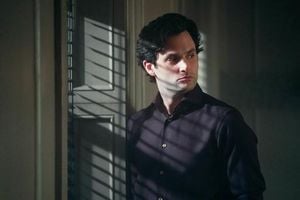Chappell Roan’s recent engagement with the American political scene has ignited significant discussion and controversy, showcasing the complications faced by young celebrities as they navigate their platforms during tumultuous electoral times. The 26-year-old pop star, who is making waves with her music career, finds herself increasingly at the center of political discourse due to her outspoken views and public statements.
Roan, originally from Missouri, has rapidly ascended to fame since her debut album, The Rise and Fall of a Midwest Princess, gained attention. She's recognized not just for her catchy tunes but also for her vibrant persona and engagement with social issues, especially those affecting the LGBTQ+ community. Recently, she made headlines for her candid remarks about the upcoming presidential election, leaving fans and critics divided over her views on politicians, particularly Vice President Kamala Harris and former President Donald Trump.
After she expressed uncertainty about endorsing Harris, stating, "I don’t feel pressured to endorse someone... there’s problems on both sides," many fans were quick to lash out. Her comments were misinterpreted by some as tacit support for Trump, prompting Roan to clarify her position on various social media platforms. Although she indicated she would vote for Harris, she emphasized her disappointment with both major political parties and called for voters to exercise their own judgment and engage critically with political platforms.
"There’s no way I can stand behind some of the left’s completely transphobic and completely genocidal views," Roan explained. Her frankness sparked backlash, particularly among those who viewed her nuanced approach as insufficiently supportive of Harris, who many young liberals believe is the best option for protecting LGBTQ+ rights. Criticism intensified on platforms like TikTok, where Roan posted to clarify her stance, asserting she wants to choose candidates thoughtfully, rather than simply align herself with party lines.
The backlash reached its peak when she canceled scheduled performances at the All Things Go festival days before the show, citing the overwhelming pressure and desire to prioritize her mental health. “Things have gotten overwhelming over the past few weeks and I am really feeling it,” Roan posted on her Instagram story, emphasizing her need to be present and authentic during her performances. The festival organizers supported her decision, highlighting the importance of mental well-being for artists.
The public's mixed reactions to Roan's comments indicate the difficulties faced by artists who choose to speak out on political issues. On one hand, some view her honesty and refusal to choose sides as refreshing; on the other, many feel betrayed by her lack of unwavering support for Harris. The singer’s fanbase has become polarized, with some fans expressing solidarity and others outright denouncing her ambiguity during such a consequential election season.
Ethel Cain, another rising star within the music industry, defended Roan on social media, criticizing the fierce backlash from fans and commentators alike. Cain dismissed the criticism, arguing, "y’all cannot be stupid enough to scream ‘f*ck Israel’ all year and then go happily vote for Kamala.” Her comments reflect the frustration of many young voters who feel disillusioned with the lack of substantial political choices presented to them.
Through the turmoil, Roan remains committed to speaking her mind. “I’m done talking about it. If you don’t get what I’m saying from this, it’s a lost cause. And I’m not forcing you to agree with me,” she stated firmly. This refusal to conform to societal pressures is indicative of the broader challenges faced by public figures—balancing personal beliefs with fan expectations.
Roan's experience adds to the pedagogical discourse surrounding celebrity involvement in politics. Critics of the mass expectations placed on celebrities argue they don't shortcut to informed political endorsements simply on the basis of fame. Instead, it’s argued, they should be allowed the space to form and express nuanced opinions, which often reflect the complexity of the political climate as viewed through their unique perspectives.
Among her supporters, many assert the power of celebrity voices can mobilize voters to think critically about whom they endorse—not just follow. Fans like Indica Elizabeth, who runs one of Roan's largest fan accounts, noted, "An endorsement from someone should not be what makes you decide on who to vote... It can affect so many of our futures." This sentiment echoes the importance of agency, particularly among young voters who have felt disenfranchised.
The upcoming election will undoubtedly bring more scrutiny, debates, and discussions about the role celebrities should play. Roan's case embodies the challenges of engaging public discourse without losing personal authenticity amid societal expectations and political pressures. Her struggle speaks volumes to both her fans and critics, creating unresolved tension about the responsibility of influential figures during pivotal moments. Silence or endorsement, it seems, will forever remain under public scrutiny as society grapples with the intersections of fame, politics, and personal belief.
Viewing the political stakes through the eyes of young artists like Chappell Roan, the urgency for engaging critically with the electoral process becomes more apparent. The narrative surrounding her experience suggests the importance of encouraging open dialogue when faced with conflicting political environments, and how individuals can navigate those challenges, reflecting the vast array of perspectives present even within singular communities.
With the 2024 election nearing its climax, Roan's positions and experiences will likely remain pivotal examples for many young voters. Indeed, the reality of celebrity influence on politics continues to evolve, with artists like Roan leading conversations about how to engage authentically regardless of public opinion.



